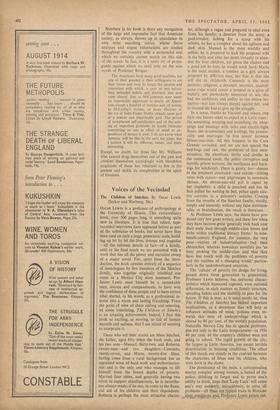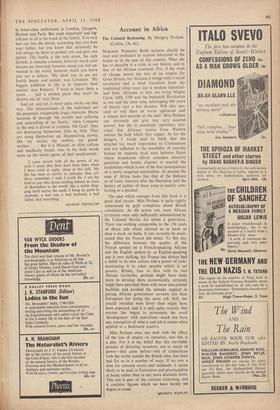Voices of' the Vecindad
The Children of Sanchez. By Oscar Lewis. (Seeker and Warburg, 36s.) OSCAR LEWIS is a professor of anthropology at the University of Illinois. This extraordinary book, over 500 pages long, is something quite new in literature. It is true that edited, tape- recorded interviews have appeared before as part of the substance of books, but never have they been used on such a huge, panoramic scale, build- ing up bit by bit the lives, dramas and tragedies —all the intimate details in fact—of a family, until in the final result we are presented with a work that has all the power and narrative sweep of a major novel. For, apart from the intro- duction, the book consists entirely of a sequence of monologues by five members of the Sanchez family, who together originally inhabited one room in a Mexico City slum tenement. Pro- fessor Lewis must himself be a remarkable man, sincere and compassionate, to have won the confidence of these people and to have turned what started, in his words, as a professional in- terest into a warm and lasting friendship. From the point of view of sheer editing and selecting, let alone translating, The Children of Sanchez is an amazing achievement. Indeed, I find this book so exciting, so moving, so full of human warmth and sadness, that I am afraid of seeming to overpraise it.
Those who tell their stories are Jesus Sanchez, the father, aged fifty when the book ends, and his two sons—Manuel, thirty-two, and Roberto, twenty-nine—and two daughters—Consuelo, twenty-seven, and Marta, twenty-five. Jesus, having come from a rural background, has an ingrained sense of hard work and anthoritarian- ism and is the only one who manages to lift himself from the lowest depths of poverty. Married four times, and generally having two wives to support simultaneously, he is neverthe- less always ready, if he can, to come to the finan- cial aid of his children and their dependants. Roberto is perhaps the most attractive charac- ter, although a rogue and prepared to steal even from his family; a deserter from the army, a
gaol-breaker, itching for a scrap with his stiletto, he has a complex about his ugliness and dark skin. Manuel is the most worldly and selfish; he is prepared to kick his pregnant wife in the belly and after her death virtually to aban- don his four children, yet given the chance and
a good job he feels he would work hard. Marta
is the most sluttish, a tomboy as a girl; always pregnant by different men, her fear is that she will die in childbirth. Consuelo is the most pathetic; religious, a dreamer, secretive, quarrel- some ('she would create a tempest in a glass of
water'), not particularly interested in sex, she had the ambitions and ability to rise above her station—but fate always played against ,her, and in the-end she had to give up the struggle.
In a sense, thanks to Visconti and others, one feels one knows what to expect in a Latin slum : the screaming, weeping and scratching, the whip- pings and beatings with belts and electric-light flexes, the drunkenness and knifings, the promis- cuity and marriages `in free union' between ,fifteen-year-olds. All this happens in the Casa Grande vecindad, and we are not spared the bed-bugs and rats, the problems of first men- struation, the abortions, births and deaths in the communal room, the police corruption and horrific prison tortures, the marijuana and burn- ings for witchcraft. There is gaiety, too—dances in the tenement courtyard—and suicide—slitting veins with razors—and pilgrimages to mountain shrines. An eleven-year-old girl is raped by her stepfather, a child is punched and has its hair pulled for wetting its bed, police apply elec- tric currents to a prisoner's testicles. Coming from the mouths of the Sanchez family, vividly, simply and sincerely, without any false sentimen- tality or brutalisation, the result is literature.
As Professor Lewis says, the slums have pro- duced very few great ‘writers, and these few when they have become great `generally look back over their early lives through middle-class lenses and write within traditional literary forms.' In nine- teenth-century England, for instance, the very poor—victims of industrialisation—had their chroniclers, whereas nowadays novelists are `so busy probing the middle-class soul that they have lost touch with the problems of poverty and the realities of a changing world,' particu- larly in the underdeveloped countries.
The `culture' of poverty (or design for living, passed down from generation to generation), Professor Lewis believes, has universal charac- teristics which transcend regional, even national differences, in such matters as family structure, spending habits and the inability to plan for the future. If this is true, as it must surely be, then The Children of Sanchez has indeed important implications, as a document that will help to influence attitudes of mind, policies even, to- wards this state of underprivilege which is shared by 80 per cent. of the world's population. Naturally Mexico City has its special problems, due not only to the Latin temperament—in 1956 40 per cent. of the country's children were not going to school. The rapid growth of the city, the largest in Latin America, has meant terrible deterioration in housing conditions. The effect of this stands out clearly in the contrast between the characters of Jesus and his children, who were born in the slums.
The dominance of the male, a corresponding martyr complex among women, a hatred of the police, drinking to forget and to prove one's ability to drink, hope that 'Lady Luck' will come one's way suddenly, miraculously, to solve all problems—all these are typical traits in Mexican sluntcopgAigps and, Professor Lewis points out, in lower-class settlements in London, Glasgow, Harlem and Paris. But most important and sig- nificant of all is the bond of the family. You may tear out into the streets, screaming that you hate your father, but you know that ultimately he will always be there to protect you and give you shelter. The family is the only straw, the only lifebelt; it remains constant, however much your dreams are thwarted, however much you feel un- wanted in the world, however much you know you are a failure. 'My ideal was to see my family happy and united,' says Consuelo. 'My biggest ambition in life is to improve their station.' says Roberto. 'I want to leave them a room . . . just a modest place they won't be thrown out of,' says Jesus.
And yet, and yet, it never quite works out that way. The idiosyncrasies of the individual are the perpetual, insuperable, tragic obstacles. Marta becomes ill through 'the trouble and suffering and quarrelling of my family,' while Consuelo in the end is driven to exclaim, 'Oh God! They are destroying themselves, little by little. They are using themselves up, disappearing slowly, like my uncles, my mother, my grand- mother. . . .' But it is Manuel, so often callous and needlessly brutal, who in his final words sums up the whole agony of their predicament:
'I curse myself with all the power of my soul. I swear that there have been times when I have cried at night, alone in the café. My life has been so sterile, so unhappy, that, por Dios, sometimes I wish I could die. I am the kind of guy who leaves nothing behind, no trace of themselves in the world, like a worm drag- ging itself across the earth. I bring no good to anybody; a bad son, a bad husband, a bad father, bad everything.'
RALEIGH TREVELYAN



































 Previous page
Previous page